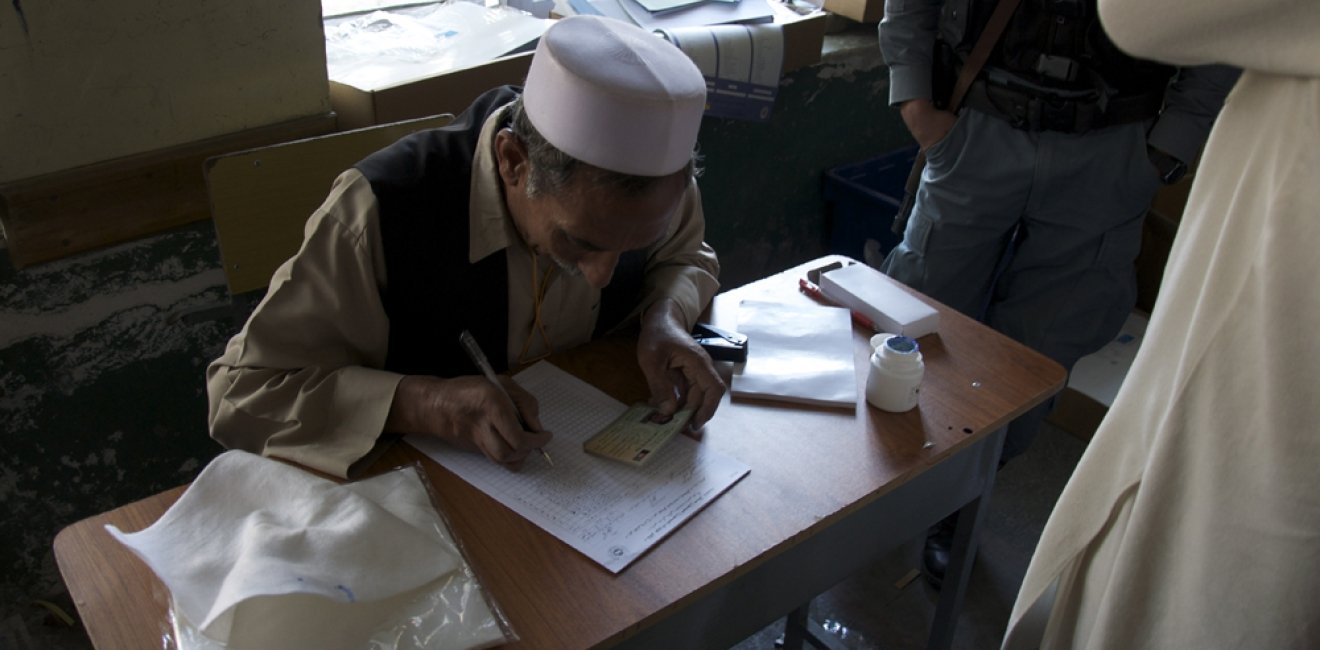
A blog of the Indo-Pacific Program
On April 22, the terror group ISIS claimed responsibility for an attack on a voter registration site in Kabul, Afghanistan, that killed nearly 60 people. The tragedy followed four other election-related attacks, including the abduction of three election workers in the central province of Ghor, over the last week.
This recent violence underscores the security challenges facing Afghanistan as it prepares to hold parliamentary elections in October.
First, ISIS’s ability to carry out mass-casualty attacks underscores the group’s resilience. ISIS is an isolated organization in Afghanistan. It is despised by the Afghan people, but it is also opposed by other militant groups operating there—most of which are closely aligned with al-Qaeda, ISIS’s bitter rival. The Taliban, in fact, is actively fighting ISIS on the battlefield. There are also tensions over sect. While most terror groups in Afghanistan adhere to the Deobandi brand of Sunni Islam, ISIS is Salafist. Another problem for ISIS in Afghanistan is that it’s getting hit hard—very hard. For several years, it’s been subjected to a relentless shock and awe display of Afghan and American air strikes—including, at one point, the use of America’s largest non-nuclear bomb, which was dropped on an ISIS hideout in eastern Afghanistan.
And yet, today, despite all this, ISIS is alive and well in Afghanistan, staging attacks while maintaining its presence in its eastern stronghold, while also developing a new presence near Kabul.
Second, Afghanistan faces the very real prospect of two major terror groups taking aim at election-related targets. The Taliban, which rejects elections, frequently attacks such sites. ISIS, which regularly goes after sectarian targets, went after Shia Muslim voters in Sunday’s attack. Though the Taliban and ISIS are rivals, their tactics are coalescing around a shared goal of attacking election targets.
Given these security concerns, preparing for elections by October will be a very tall order for Afghanistan. The sobering reality is that the motivation behind opening the voter registration center targeted on April 22, and the several other similar facilities targeted as well in recent days, is to encourage people to vote amid growing concerns about low turnout on Election Day.
In effect, election officials are braving security threats to strengthen the credibility of an election that many Afghans may not bother to vote in. Many Afghans—like those in so many other countries—are bitter and disillusioned about their political leaders. And they’re very unhappy with a government that they believe has failed to deliver basic services, much less tackle a strengthening insurgency, and has instead been mired in dysfunction in personality disputes. Over the last few years, officials loyal to Chief Executive Officer Abdullah Abdullah have lashed out at President Ashraf Ghani, and even threatened to launch civil disobedience campaigns on the street to protest the government’s inability to improve security.
This is all a far cry from 2014, the year of Afghanistan’s last election, when Afghans braved Taliban threats to come out to the polls in droves. In the end, many were disappointed, because allegations of fraud led to a post-election stalemate and an eventual U.S.-led negotiation that created the current national unity government. In this regard, Afghanistan’s current government is not an elected one. Afghans today haven’t forgotten this fact, which may make them even more hesitant to vote in the parliamentary elections this year, and in the presidential polls scheduled for 2019.
That is, if the elections even happen.
Election officials, for now, insist the October polls will occur on time. However, if they eventually conclude there is insufficient security for elections, they may be delayed until next year and combined with the presidential polls. If elections can’t be held next year, when the government’s term is scheduled to expire, Afghanistan could face a major political crisis. If there’s no election next year, the government will face an immediate and acute crisis of legitimacy.
In a nation with strong political fault lines, such a crisis could well spark civil unrest and, in a worst-case scenario, outright conflict. Under such circumstances, those that thrive in environments of instability—such as ISIS and the Taliban—would be the biggest winners.
This post is an expanded version of a short essay published for Axios Expert Voices.
The views expressed are the author's alone, and do not represent the views of the U.S. Government or the Wilson Center. Copyright 2018, Asia Program. All rights reserved.
Author


Indo-Pacific Program
The Indo-Pacific Program promotes policy debate and intellectual discussions on US interests in the Asia-Pacific as well as political, economic, security, and social issues relating to the world’s most populous and economically dynamic region. Read more


Middle East Program
The Wilson Center’s Middle East Program serves as a crucial resource for the policymaking community and beyond, providing analyses and research that helps inform US foreign policymaking, stimulates public debate, and expands knowledge about issues in the wider Middle East and North Africa (MENA) region. Read more





